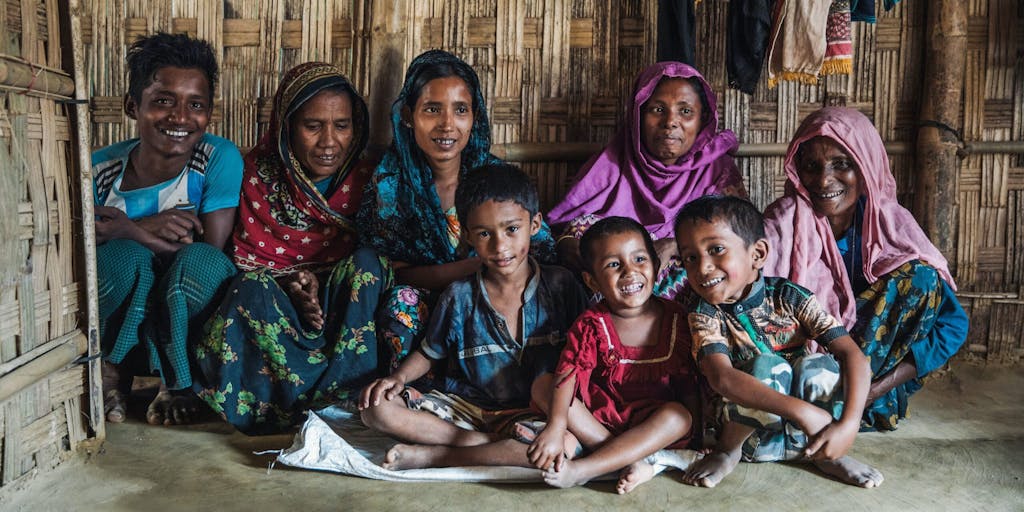When Salamot Khan was just a few months old, his family fled their home in Myanmar to seek safety across the border in Bangladesh. Salamot became one of about half a million children living in the Rohingya refugee camps outside of Cox’s Bazar, Bangladesh. Children like him have suffered trauma, witnessed violence, and still experience daily challenges that make them among the most vulnerable people in the world.

There are the ever-present challenges associated with extreme poverty: lack of clean water, no access to formal education, parents needing opportunities to feed their own families. And then there are the hazards of refugee life. The Rohingya refugee camps are one example of how infectious diseases may become a major health issue in a disaster situation.
It’s a situation where people live together in crowded, unsanitary refugee camps. Every family struggles to access enough food. And hundreds of thousands of children are malnourished. This makes their bodies even more susceptible to illness and even death. It’s places like this where infectious diseases spread quickly and forcibly if not prevented.
Because of this, today we want to share with you five reasons why vaccines are a crucial part of protecting vulnerable refugee children.
1. Infectious diseases are one of the biggest threats to the health of refugee children.
Immunizations can effectively prevent many of life-threatening illnesses and stop children from dying. But unfortunately, Salamot never received immunizations home in Myanmar. Neither did most of the other Rohingya children. That means that the refugee camps are crowded with 500,000 children with weakened immune systems. No access to basic health resources. And no previous immunizations. All living in a place conducive to the rapid spread of deadly illnesses like smallpox, diphtheria, and others.
In these crises situations, access to food and clean water help avoid many life-threatening illnesses. They work together with immunizations to promote the healthiest possible environment for refugees to survive and thrive even in the midst of extreme hardship.
2. Vaccines prevent some of the biggest killers of children under the age of 5.
UNICEF estimates that 5.4 million children under the age of 5 died in 2017. Although this number is lower than in the past, more than half of these deaths could have been prevented with access to health care. Some of the most deadly childhood diseases include measles, diphtheria, tetanus, and certain types of pneumonia and diarrhea. Several of these, like diphtheria, are also common in refugee camps. And yet there are vaccines available that can protect children from all of these illnesses.
3. Immunizations are more effective when more people receive them.
The power and the key to vaccines sit in the same truth: high immunization rates protect more people in the broader community. This means that when healthy people receive vaccines, their immunization helps “shield” even members of the community like newborn babies and elderly adults who are more susceptible to serious illness.
4. Vaccines are cost-effective.
According to UNICEF, immunization is one of the most cost-effective child health actions. In fact, every dollar spent immunizing a child translates into $44 USD economic benefits through savings on medical expenses and avoiding loss in productivity. Add to that the deep theological value of saving the lives of children? Supporting vaccines for children in a refugee context promotes good financial sense and has great spiritual significance.
5. Vaccines are one of the most effective global public health interventions ever.
According to the World Health Organization, vaccines are one of the most effective ways to reduce the impact of infectious diseases. In fact, vaccines are second in importance only to clean water. They are a resource with the power to dramatically affect human health. This makes it essential for refugee children to access the many benefits of vaccination. The benefits range from longer life expectancy to saving money on health care to cancer prevention and protection from related diseases, and so much more! Every year, vaccines prevent 2 to 3 million deaths. That number could be even higher! More people vaccinated could save another 1.5 million lives every year by protecting them from a host of illnesses. How could we ignore that possibility?
Let’s Get Back to Salamot’s Story

Salamot received his very first vaccines when he visited a Food for the Hungry (FH) clinic with his grandmother, Hamida. Trained health staff shared with Hamida how receiving vaccines protect Salamot’s life. But she also learned that vaccines ensure the safety of the most vulnerable people in the Rohingya camps: pregnant mothers and newborn babies. Now, Hamida told us, “I’m really happy to know about the importance of vaccination.”
Back home in Myanmar, the children suffered from many diseases. Now Hamida understands why, and she says, “It is a blessing to have a clinic that is giving both free immunizations and [health] counseling.”
Today, little Salamot still lives in a Rohingya refugee camp. But thanks to the concerted efforts by the Bangladesh government and organizations including FH, he is safer because of vaccination campaigns. You can support FH’s health programs and learn how to get involved here.
Learn more about the Rohingya refugee crisis:
Three Hidden Costs of Being a Refugee


